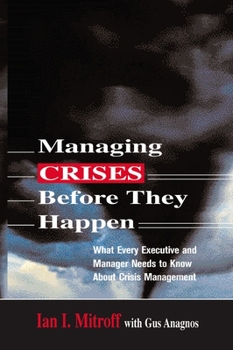Managing Crises Before They Happen: What Every Executive and Manager Needs to Know about Crisis Management
Select Format
Select Condition 
Book Overview
Discover the crisis management tools that successful executives and managers utilize to stay ahead of crises, before they happen. From tragic accidents to public relations fiascos, we live in an increasingly crisis-ridden society. In fact, half of the major industrial accidents of the past century occurred in the last 20 years. Why is this--and what can be done to reverse this disturbing trend? According to crisis management...
Format:Paperback
Language:English
ISBN:0814473288
ISBN13:9780814473283
Release Date:June 2005
Publisher:Amacom
Length:192 Pages
Weight:1.50 lbs.
Dimensions:0.5" x 5.9" x 9.1"
Customer Reviews
2 ratings
A framework for crisis management
Published by Thriftbooks.com User , 18 years ago
Understanding that completely eliminating crises is impossible, the authors of this book lay out a model any company can use to limit both duration and the magnitude of the crisis. This model ensures the major objectives of a company's business are not derailed during a crisis or series of crises. A best-practice model is offered that identifies five factors that companies must manage before, during, and after a crisis: 1) the type and risk categories of crises, 2) mechanisms, 3) systems, 4) stakeholders and 5) scenarios. These five components form a crisis-management framework, that when integrated with other important organizational programs, such as planning, issues management, or quality assurance, will help companies weather severe storms. The authors discuss the importance of truth-telling. In the light of the recent events with Enron and Andersen, the authors' advice to companies to not ask if the truth will be revealed, but rather when the truth will become public and under what circumstances, seems both timely and poignant.
Anticipate, Prepare, and Respond
Published by Thriftbooks.com User , 23 years ago
Mitroff (with Anagnos) explains "what every executive and manager needs to know about crisis management." He correctly asserts that crises occur because "a significant amount of the overall system fails. Thus, CM is inherently the process of seeing and dealing with larger, whole systems." Moreover, "The basic or most central problem is that [because it goes sharply against the grain of of current management thought and practice] it requires cultural acceptance, and unfortunately, in the vast majority of cases, major cultural transformation." The material is organized as follows:Chapter One: Why Crises Are an Inevitable and Permanent Feature of Modern SocietiesChapter Two: The Failure of Success: The Tylenol Poisonings, Crisis Management's "Ancient History"Chapter Three: A Best Practice Model: A General Framework for Crisis ManagementChapter Four: Should We Tell the Truth? The Varieties of Truth and Telling the TruthChapter Five: Assuming Responsibility: Victim or Villain?Chapter Six: Detecting Weak Signals: Making Sure That You Are the First to Get the Worst News!Chapter Seven: Thinking Far Outside of the BoxesChapter Eight: Treating the Big PictureChapter Nine: Crisis Management 2002: The Challenges AheadIn The Art of War, Sun Tzu asserts that every battle is won or lost before it is fought. Hence the great importance Mitroff assigns to anticipation and preparation. I think his book would have even greater value if read in combination with Peter Schwartz's The Art of the Long View. Given the importance of this subject to any organization (regardless of its size or nature), I also recommend Steven Fink's Crisis Management. When concluding his book, Mitroff offers these suggestions: "Start by designing and implementing signal detection [ie early warning] mechanisms throughout your organization. Start by amplifying the signals that already exist in your organization of impending crises. In many cases, the databases that indicate signals of impending crises may already exist, but they need to be reconceptualized to show their relationship to CM." Sound advice. But ultimately, even the most comprehensive and sophisticated CM system cannot predict or suggest, much less prevent, every crisis. Once a crisis occurs, one of the most important questions Mitroff answers is "Now what?" That answer alone is well-worth the cost of this important book.





